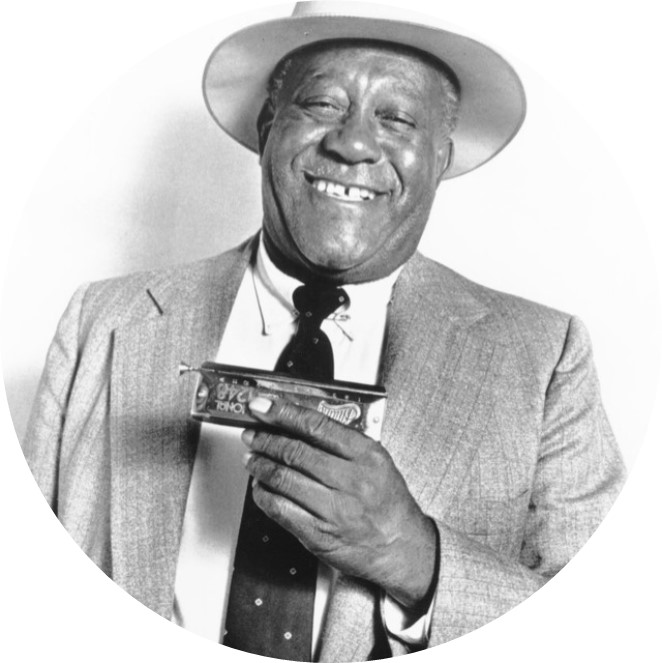 Snooky Pryor, was one of the pioneers of the classic Chicago blues of the post-World War II era, a byproduct of the migratory wave of musicians from Mississippi and the Deep South who changed the sound of the city with their electrified update of Delta blues. After playing a bugle (and harmonica) through a P.A. system while serving in the war, Pryor bought a P.A. system with speakers in Chicago and became one of the first harp players to amplify his sound with electricity.
Snooky Pryor, was one of the pioneers of the classic Chicago blues of the post-World War II era, a byproduct of the migratory wave of musicians from Mississippi and the Deep South who changed the sound of the city with their electrified update of Delta blues. After playing a bugle (and harmonica) through a P.A. system while serving in the war, Pryor bought a P.A. system with speakers in Chicago and became one of the first harp players to amplify his sound with electricity.
Pryor made some historic recordings for several Chicago labels, including Boogie (Snooky and Moody’s Boogie), a predecessor to Little Walter’s massive hit Juke, and Judgment Day (later revived by British rockers the Pretty Things and Eric Clapton), but none sold well enough to make the charts. He had some success in the city’s nightclubs but finally dropped off the scene in the 1960s, disillusioned with the music business. Rumors and questions about his whereabouts puzzled blues fans and researchers for years. Some thought he had turned to preaching or to Islam. Neither was true, although he was the son a preacher who forbade “devil music” (the blues) in the home, and he could quote the Bible at length.
But on a phone call one night in 1971, guitarist Homesick James told Living Blues magazine that he had an old friend with him: “You know Snooky Pryor?” Pryor and his family had moved to Ullin in southern Illinois, where he was working as a carpenter. An article in the magazine led to a musical revival for Pryor, who resumed his recording career and went on to play concerts, clubs and festivals to an enthusiastic new generation of international blues aficionados. He picked up where he had left off, singing and playing the same spirited kind of blues he had perfected in the 1950s, eschewing the influences of subsequent soul, funk and rock music trends that changed the approach of many others in Chicago.
Born in rural Quitman County, Mississippi, near Lambert and Denton, on September 15, 1919 (not 1921 as he usually said), James Edward Pryor took up harmonica and the blues in spite of his father’s rules. A childhood friend was future Chicago legend Jimmy Rogers, who was then nicknamed Snooky. Bluesman Floyd Jones later dubbed Pryor as Snooky (pronounced to rhyme with “nuke” rather than “nook”) in Chicago. Pryor left home as a teenager and traveled through Mississippi, Arkansas, Missouri, and Illinois, finally settling in Chicago, where his musical partners included Floyd and Moody Jones, Homesick James, Johnny Young and Eddie Taylor. His first Chicago recordings for Planet, J.O.B., Parrot and Vee-Jay have all been reissued on CD and LP.
After his 1960s hiatus he cut his first album on the Today label, followed by a slew of others in the U.S., Europe and Canada for Big Bear, Blind Pig, Antone’s, Wolf, Electro-Fi and other companies. Though he made occasional Chicago appearances and worked for a while with Willie Dixon’s Chicago Blues All Stars, he continued to reside in Ullin, where he trained his sons Earl and Richard (“Rip Lee”) to play. Rip Lee has continued to perform in the venerated style of his father, who died in a Cape Girardeau, Missouri, hospital, on October 18, 2006.
Inducted in 2023 The Blues Foundation’s Hall of Fame
-Jim O’Neal, BluEstorica.com
